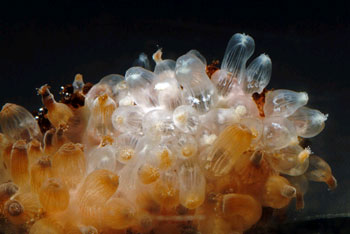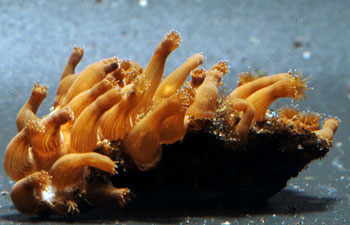Global warming is melting soft corals
Global warming is melting soft corals
mongabay.com
November 13, 2007
Soft corals are “simply melting and wasting away” due to global warming-induced environmental stress says Dr. Hudi Benayahu, head of Tel Aviv University’s Porter School of Environmental Studies.
Unlike conventional corals, soft corals have no calcified outer skeleton to protect and support them. When they die, they leave no trace of their existence. Benayahu has witnessed a sharp decline in soft corals in recent years. Whereas he once found soft corals in 50-60 percent of his study sites around the world, just a few years later only about five percent have soft corals.
“There was a massive disappearance of soft corals,” he remarked about a Japanese soft coral reef. “You can’t imagine this was the same site. Just two years passed and the entire area was deserted, lifeless.”

A soft-bodied stony coral after exposure to acidified experimental conditions. Under relatively high temperatures, these corals may lose their algal symbionts and become pale (bleached) or even transparent. [Image courtesy of A. Briestien]
Anemone-like stony coral after exposure to acidified experimental conditions. While the soft body coral survives, reproduces and grows bigger than usual, it loses its calcareous skeleton. [Image courtesy of A. Briestien] |
Benayahu warns that the loss of soft corals may have economic consequences as well as ecosystem effects. Soft corals are known to help maintain the health and balance of reef ecosystems and form symbiotic relationships to numerous animals. The pharmaceutical industry have also derived important drugs from soft coral tissues.
“It’s too late. We have now actually missed the boat in finding some key pharmaceuticals,” said Benayahu.” There is a huge gap in our knowledge of soft corals in the reef environment, and with the rate of extinction, we have lost certain species forever.”
While Benayahu warnings are dire, other research suggests that some types of corals may survive environmental changes caused by higher ocean acidity driven by elevated CO2 levels.
In March, Israeli biologists Maoz Fine and Dan Tchernov reported that some stony corals can survive increased acidity by morphing into soft-bodied polyp forms. The corals produce hard skeletons again once pH level returns to normal. The research helps explain when some corals disappear and reappear on the fossil record. As soft-bodied polyps, corals will not leave recognizable fossil remains.
Despite these findings, Fine and Tchernov warn that decreasing ocean pH will cause profound changes to most coral species, degrading overall coral reef health and the systems the ecosystems afford mankind.
Related
Coral reefs declining faster than rainforests
(8/8/2007) Coral reefs in the Pacific Ocean are dying faster than previously thought due to costal development, climate change, and disease, reports a study published Wednesday in the online journal PLoS One. Nearly 600 square miles of reef have disappeared per year since the late 1960s, a rate twice that of tropical rainforest loss.
Coral diseases largely result from human activities
(5/17/2007) The apparent increase in infectious disease among coral is likely the result of environmental change and, as such, researchers should focus on understanding the relationship between coral diseases and environmental changes, rather than the diseases themselves, argues a paper published in the August 2007 issue of the Journal of Experimental Marine Biology and Ecology.
Global warming is killing coral reefs
(5/7/2007) A new study provides further evidence that climate change is adversely affecting coral reefs. While previous studies have linked higher ocean temperatures to coral bleaching events, the new research, published in PLoS Biology, found that climate change may increasing the incidence of disease in Great Barrier Reef corals. Omniously, the research also shows that healthy reefs, with the highest density of corals, are hit the hardest by disease.
Carbon dioxide levels threaten oceans regardless of global warming
(3/8/2007) Rising levels of carbon dioxide will have wide-ranging impacts on the world’s oceans regardless of climate change, reports a study published in the March 9, 2007, issue of the journal Geophysical Research Letters.
Coral reefs decimated by 2050, Great Barrier Reef’s coral 95% dead
(11/17/2005) Australia’s Great Barrier Reef could lose 95 percent of its living coral by 2050 should ocean temperatures increase by the 1.5 degrees Celsius projected by climate scientists. The startling and controversial prediction, made last year in a report commissioned by the World Worldwide Fund for Nature (WWF) and the Queensland government, is just one of the dire scenarios forecast for reefs in the near future. The degradation and possible disappearance of these ecosystems would have profound socioeconomic ramifications as well as ecological impacts says Ove Hoegh-Guldberg, head of the University of Queensland’s Centre for Marine Studies.
